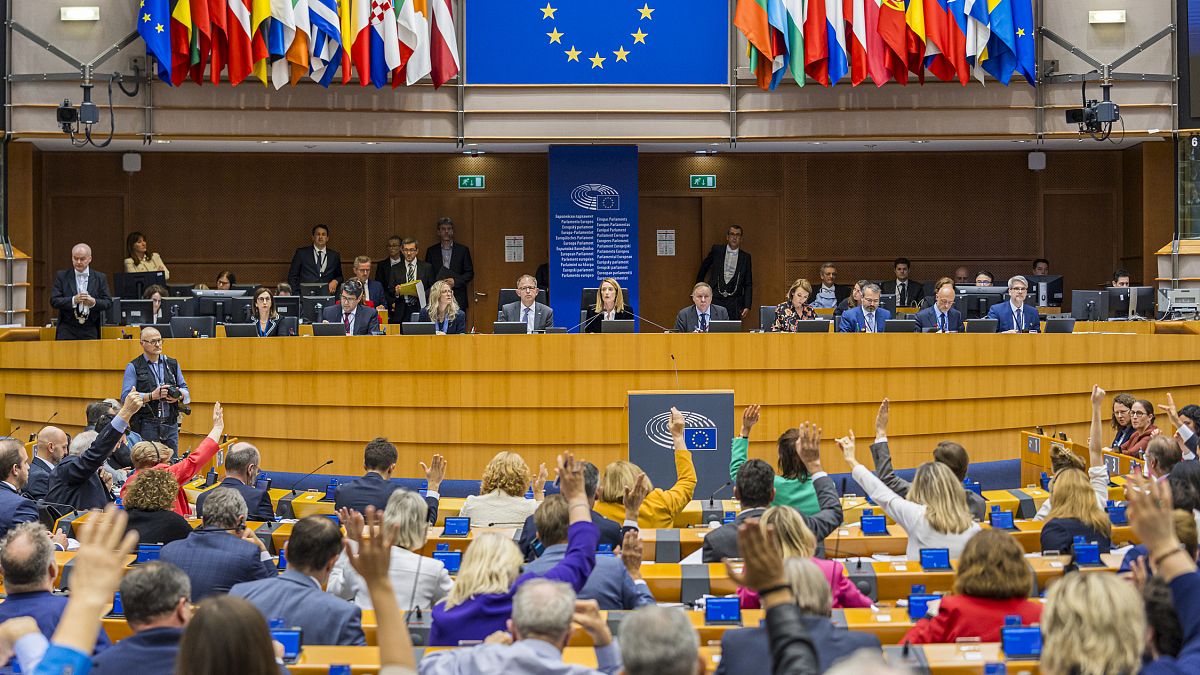New ‘super’ committees, more inquiry powers over Commissioners, and attempts to avoid apparently deserted meetings are novel features planned for the next Parliament.
MEPs spent the past 10 months tweaking and upgrading their own rules of procedure – a process initiated by Parliament president Roberta Metsola.
The scope of the reform was to address longstanding problems, such as diminished relevance when set against the other EU institutions and visible absenteeism in the chamber during some topical debates.
The process ended last week when new rules were finally approved by MEPs. Here’s a sneak peek of how parliamentary business will change during the next mandate.
‘Super’ committees
With the EU executive increasingly presenting ‘packages’ of laws rather than single legislative initiatives, clashes of competencies between two or more parliamentary committees have become a frequent occurrence in recent years.
The new rules feature a novel referral procedure to assign Commission proposals to committees more straightforwardly in a bid to pre-empt conflicts arising later – and to gain time on the EU Council, whose negotiations often proceed faster than Parliament’s.
When a specific Commission package requires scrutiny by multiple committees, special new temporary committees can be established with legislative powers to last only until the adoption of the act.
In the past, special committees – such as those on the EU’s beating cancer plan (BECA) or overseeing lessons learned from the pandemic (COVI) – were established to deal with specific issues but were unable to adopt binding texts.
Members of these ‘super’ committees – the key novelty of the reform – will be appointed by the political groups while the Parliament’s conference of presidents can decide whether to appoint one or more rapporteurs to lead the dossier and negotiate with the EU Council.
Inquiry powers over Commissioners touch on Pieper issue
Another goal of the reform was to allow more democratic scrutiny over the EU executive, an essential function of the Parliament under the EU treaties.
The new rules provide much clearer provisions governing ‘confirmation hearings’ in which MEPs greenlight designated commissioners before they assume office.
The length of the grilling session to assess the competence of potential commissioners will be extended to up to four hours, while the Commission chief is also expected to “inform Parliament about the planned structure of the new Commission,” rather than solely focusing on portfolio assignments.
Lawmakers’ thirst for more inquiry powers was on display during the recent affair involving the withdrawal of Markus Pieper from his appointment as SME envoy, a suspected case of political favouritism that shook the EU executive.
The resignation of the controversial pick for a highly paid EU official post came only after the Parliament called on the Commission to reverse the contested appointment. However, due to the lack of a specific procedure, MEPs expressed their unease by tabling an amendment on an unrelated budgetary file.
From next term, the Parliament will have a new weapon, special scrutiny hearings, through which they can question Commissioners or any other relevant individuals regarding their political actions on an issue of major political importance.
‘Ridiculous’ empty-looking plenaries will stay
When former Commission chief Jean-Claude Juncker faced an audience of just 30 lawmakers during a parliamentary hearing in 2017, he called the EU’s only democratic institution “ridiculous”.
Seven years later, absenteeism is still conspicuous – tarnishing Parliament’s image and diminishing its democratic credibility.
The reform wants to encourage more visible participation in parliamentary sessions, especially on camera. One new procedural rule states that “members shall not have pre-allocated seats and shall be encouraged to sit at the front of the Chamber”, meaning that lawmakers should gather to give the illusion of a packed crowd.
Low attendance will, however, stay in the next term as the more ambitious amendments to address the issue have been watered down in several passages before the plenary vote.
MEPs will only be “incited” – but with no real obligation – to stay in the room during a debate they are participating in, meaning they’ll be still allowed to attend for their short intervention and leave immediately afterwards.
Lack of media attention has often been considered an incentive to chronic absenteeism, particularly when the topics discussed were either too technical, or the political momentum that triggered the debate has passed.
A new provision will allow the convocation of ‘special’ plenaries to address “matters of significant political importance”, creating a platform for dialogue that can be convened at the peak of news cycles.
Only a call on gender balance
Women in the Parliament face significant underrepresentation – and not just in the hemicycle but across administrative positions. Even when they do chair committees, they are frequently relegated to overseeing lesser-known topics, perpetuating the imbalance of power and visibility within the institution.
Although expectations were high for how gender equality would’ve been treated in this reform, the final provisions have been tamed in the negotiations.
An amendment proposed by The Left incentivising more female representation passed but did not include any binding obligations on quotas.
“When nominating candidates for, and electing, the President, Vice-Presidents and Quaestors, political groups bear collective responsibility for putting forward candidates that respect the gender balance,” states the new rule tepidly.
Furthermore, in their scrutiny over the Commission, the rules now specify that the European Parliament will examine not only the composition of the college of commissioners in terms of responsibilities but also its gender balance.

